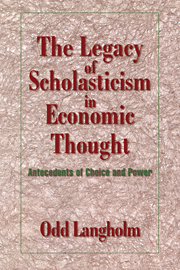Book contents
- Frontmatter
- Contents
- Preface
- Introduction
- I COMPULSION AND THE WILL: THREE ANCIENT TRADITIONS
- II NEED AS COMPULSION: THE SCHOLASTIC PARADIGM
- 4 Loans and usury
- 5 Price and market manipulation
- 6 Need and the will in buying and selling
- 7 Labor and wages
- III REJECTION AND REVIVAL IN POSTSCHOLASTIC THOUGHT
- Bibliography
- Index
5 - Price and market manipulation
Published online by Cambridge University Press: 13 March 2010
- Frontmatter
- Contents
- Preface
- Introduction
- I COMPULSION AND THE WILL: THREE ANCIENT TRADITIONS
- II NEED AS COMPULSION: THE SCHOLASTIC PARADIGM
- 4 Loans and usury
- 5 Price and market manipulation
- 6 Need and the will in buying and selling
- 7 Labor and wages
- III REJECTION AND REVIVAL IN POSTSCHOLASTIC THOUGHT
- Bibliography
- Index
Summary
Value as power
When Thomas Aquinas in De malo pleads violentia mixta on the part of a needy borrower paying usury, he adds that the position of such a borrower is similar to that of a buyer in need to whom a thing is sold at an excessive price. It is a sign of the analytic genius of Aquinas that he was able, in these simple terms, to anticipate the generalization of this central scholastic economic paradigm. More than a century was to pass before the captain who jettisons cargo became a current figure in discussions of price and before the fear that strikes a man of character became commonly associated with a buyer or a seller in economic need. In the late thirteenth century, theologians and canonists intent on defending their notion of justice in pricing were mainly occupied with a different, if related, theoretical issue. For some time to come, this tended to deflect their attention from the Romanists' coactus volui and the Aristotelians' interpretation of forced acts as being “more like voluntary acts.” Rather than arguing against the voluntary nature of forced choice in economics, they had to counter a doctrine that seemed to legitimize economic power in general, and so, by implication, to condone the application of economic compulsion. This doctrine gave rise to an extensive scholastic literary tradition. It was couched partly in general terms and partly in terms of some specific forms of market manipulation whereby economic power might be obtained, such as speculation, collusion, and monopoly. In this chapter, we shall trace the several branches of this broad tradition until they merged with the traditions presented in the preceding chapters.
- Type
- Chapter
- Information
- The Legacy of Scholasticism in Economic ThoughtAntecedents of Choice and Power, pp. 77 - 99Publisher: Cambridge University PressPrint publication year: 1998

